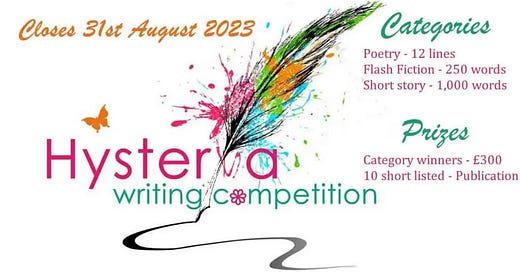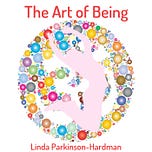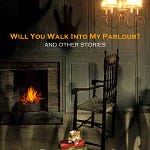This website is only made possible by the support of members of my Creative Hub community. If you would like to join and learn more about how to make the most of living a writing life by focusing on the business side of writing, then please consider joining today. Your support is much appreciated. Linda x
Do you want to learn what it takes to win a writing competition?
You’ve entered your short story, flash fiction or poetry into all sorts of writing competitions but the ultimate prize has always eluded you. You read the winning entries and wonder what they had that you didn’t, what made them stand out, whilst you faded into the background. Sometimes it’s obvious, even you would have picked them out for a top spot, but most of the time it’s hard to tell why they won and you didn’t.
In 2012 I set up the Hysteria Writing Competition. Since then, thousands of people have submitted their work in the hope they would be published in the annual anthologies, or even win each categories first place. Over the years I’ve learnt a lot from talking to the readers and judges, I’ve paid attention to the writers in residence and I’ve talked to and interviewed many of the winners. And, I’ve noticed that common themes emerge that suggest you can create and craft a winning entry.
So, in 2022 I put together a series of monthly conversations with past winners, together with these insights to help you work your own competition magic.
There’s no cost to join, and by the end you will know more about what it takes to win a writing competition, putting you in a better position to do just that.
I have split this course into two parts because it’s too long as a single post. The second part will become available in mid July.
Topics covered include:
How NOT to win a writing competition
How to win a short story competition
How to win a poetry competition
How to win a flash fiction competition
Each topic is set out below and includes a recording of the conversation with each past winner, a downloadable worksheet with hints and tips you can use today to improve your entries, and a set of links to relevant posts from the annual writers in residence.
Introduction
I’m thrilled you’ll be joining me for the How to Win a Writing Competition podcast series. What to do next:
Throughout this course I’ll share links to some of the winning entries in each category. Other writers are great to learn from and everyone published in this anthology will give you insight into what works, at least for the Hysteria Writing Competition.
Why not invite your friends to join us
If you know anyone who’d like to join in, why not send them the link so they can find out more too.
Want to ask a question?
You can use the comment section at the end of this post to ask a question. Me or one of the other readers will get back to you with an answer as soon as we are able to.
Part 1. How NOT to win a writing competition
Listen to the recording
Key Points
Pay attention to the rules
If there are guidelines, read them
If there’s a theme make sure your entry reflects it
Check your spelling, grammer and punctuation
Encourage your readers to use all their senses
Show, don’t tell
Don’t forget judges and readers are human and will have their own preferences
Suprise the readers and judges
Dare to be daring
Don’t follow the crowd
Download the worksheet
Your worksheet this month is a handy checklist you can use to remind you of the key points from this podcast. Keep it handy for the next time you’re entering a writing competition!
Additional Resources
Top 7 tips for entering writing competitions by Sophie Duffy
That elusive thing, subtext by Sophie Duffy
Landscape in writing, where are we by Sophie Duffy
What are your intentions? by Sophie Duffy
Finishing touches by Sophie Duffy
Five things to think about when submitting to a writing competition by El Rhodes
Getting started with five easy techniques by El Rhodes
Read, revise, review, repeat by El Rhodes
Of many a smutch’d deed reminiscent by El Rhodes
What makes you enter a writing competition? by Diane Jackman
Magic by Diane Jackman
Feeling inspired by Diane Jackman
Part 2. How to win a short story competition
Listen to my conversation with Jane O’Connor
Key Points
Make sure you have a central character your story can revolve around. This can be an animal as well as a human.
Use the full story arc including
Normal life
Inciting incident
Solving the problem
Demonstrable change in the characters
Make sure there is a good balance between light and dark
Try to give your story a positive ending, too many entries are overwhelmingly sad and negative
Use a strong voice or images to hook your readers in
Be clear about where your inspiration comes from
Make sure every word counts and earns it’s place on the page
Think carefully about how you pace your story, making sure it moves along nicely and encourages readers to turn the page
Let your readers use their imagination, you don’t have to fill in the blanks, they can do that themselves
If you’re writing anything historical make sure your language, clothes, locations and foods are all contemporary with the period.
Download the worksheet
Your worksheet this month is a handy checklist you can use to remind you of the key points from this podcast. Keep it handy for the next time you’re entering a short story writing competition! It also features an exercise if you’re stuck for a bit of inspiration.
Read the winning entries
Banana Loaf: A recipe for solace by Jayne Thickett (2012)
Fibonacci’s Tree by Tracy Fells (2013)
Drowning in Lemon Juice by Tracey Glasspool (2014)
No Odysseus by Shauna Mackay (2015)
A ‘ta da’ Moment by Sandra Crook (2016)
Still Life by Lindsay Bamfield (2017)
The Flower Box by Jane O’Connor (2020)
The Day of Glorious Silliness by Jill Waters (2021)
Et in Arcadia Ego by Alexandra Packer (2022)
Additional Resources
How to write a short story by Bridget Whelan
Short stories in short by Alex Reece Abbott
That’s it for the first part of this free course. Part Two will be available in the middle of next month.










Share this post